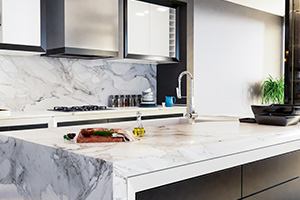 When it comes to selecting the ideal countertop for your kitchen or bathroom, the options seem endless. Among the most popular choices are granite, quartz, and soapstone. While each material has its own unique qualities, making an informed decision requires a deeper understanding of their characteristics and performance.
When it comes to selecting the ideal countertop for your kitchen or bathroom, the options seem endless. Among the most popular choices are granite, quartz, and soapstone. While each material has its own unique qualities, making an informed decision requires a deeper understanding of their characteristics and performance.
If you’re shopping for a new countertop material, here’s what you need to know when choosing between granite, quartz, and soapstone.
Aesthetic Differences Between Quartz, Soapstone, and Granite
One of the most captivating aspects of choosing a countertop is selecting the perfect colors and patterns to complement your space. Granite, quartz, and soapstone each offer distinct options, ranging from vibrant hues to subtle veining. Understanding the nuances of these materials can help you make a selection that not only enhances your aesthetic preferences but also harmonizes with your overall design scheme.
Granite Appearance
Granite countertops showcase an infinite array of natural colors and patterns, making each slab unique. From the subtle elegance of speckled whites and grays to the dramatic veining of exotic stones, granite offers an unparalleled diversity of options.
Whether you prefer the understated sophistication of earth tones or the bold statement of exotic colors, granite can cater to a wide range of design preferences. From classic black and white to vibrant blues and greens, there’s a granite slab to suit every style.
The organic beauty of granite lies in its inherent variations, which stem from the geological processes that formed each stone. No two granite countertops are exactly alike, ensuring that your space possesses a one-of-a-kind charm.
Quartz Appearance
Unlike natural stone, quartz countertops offer more uniformity in color and pattern. While still available in a wide range of hues, quartz tends to have fewer random variations, providing a cohesive appearance across the surface.
Quartz manufacturers can replicate the look of natural stone, including marble and granite, as well as create unique designs that are not found in nature. This versatility allows for greater customization and creativity in countertop design.
With its sleek and contemporary appearance, quartz countertops are favored by those seeking a polished and refined look. Whether you prefer a minimalist design or a bold statement piece, quartz can elevate the aesthetic of any space.
Soapstone Appearance
Soapstone countertops are characterized by their timeless appeal, often featuring dark grey or green hues with subtle veining. The understated beauty of soapstone lends a sense of warmth and sophistication to any kitchen or bathroom.
While soapstone may not offer the same range of colors as granite or quartz, its earthy tones evoke a sense of natural beauty and tranquility. The subtle variations in color and veining add depth and character to the surface.
Unlike other materials that may follow trends, soapstone countertops exude a timeless charm that transcends fleeting fashions. Whether paired with traditional or contemporary décor, soapstone remains a classic choice for discerning homeowners.
READY FOR BEAUTIFUL COUNTERTOPS?
Our team of experts is here to answer all your questions - we can even schedule a no-obligation, in-person or video estimate.
Which Countertop Material Is Most Functional?
Beyond their aesthetic appeal, the functionality of countertop materials plays a crucial role in determining their suitability for everyday use. From durability to heat resistance, granite, quartz, and soapstone each offer unique features that contribute to their functionality in the kitchen or bathroom. Understanding these attributes can help you choose a countertop material that not only looks stunning but also meets your practical needs:
- Granite is renowned for its exceptional hardness, granite countertops are highly resistant to scratches and dents, making them ideal for high-traffic areas such as kitchens. This material is also very heat resistant allowing you to place hot pots and pans directly on the surface without fear of damage.
- Quartz is engineered for durability, quartz countertops are highly resistant to scratching, chipping, and staining, making them a low-maintenance option for busy kitchens. Unlike natural stone, quartz countertops have a non-porous surface that repels moisture and prevents the growth of bacteria and mold. They are also less likely to develop inconsistencies or flaws over time, ensuring long-term functionality.
- Soapstone is surprisingly durable despite its soft texture. This material has natural heat-absorbing properties, allowing it to withstand hot pots and pans without sustaining damage. While it may scratch easily, these marks can contribute to its unique patina over time.
Are Quartz, Granite, and Soapstone Heat-Resistant?
When it comes to heat resistance, soapstone and granite stand out as the most resilient among the three countertop materials. Whether you’re placing hot pots directly from the stove or setting down baking trays fresh from the oven, these materials will perform well even with high temperatures.
Which Material Is Most Durable?
When considering the longevity of countertop materials, several factors come into play, including durability, maintenance requirements, and resistance to wear and tear. Here’s how granite, quartz, and soapstone stack up in terms of longevity.
Granite Durability
With proper maintenance, granite countertops can stand the test of time, retaining their beauty and functionality for decades. Its exceptional hardness and resistance to scratches and heat contribute to its longevity, making it a durable choice for high-traffic areas.
Quartz Durability
While quartz offers excellent durability and resistance to staining and scratching, its longevity may be impacted by inconsistent manufacturing standards. With proper care, quartz countertops can provide lasting value, but variations in quality control may affect their long-term performance.
Soapstone Durability
Soapstone countertops develop a distinctive patina over time, adding character and charm to the surface. While scratches and dents may occur, they contribute to the natural aging process of soapstone, enhancing its timeless appeal.
Which Material Is Easiest To Maintain?
Among the three countertop materials, quartz emerges as the easiest to care for due to its non-porous surface and minimal maintenance requirements. Unlike granite, quartz does not require periodic sealing, eliminating the need for regular reapplication of sealant. Additionally, its non-porous nature makes quartz highly resistant to staining and bacterial growth, simplifying the cleaning process. With routine cleaning using soap and water or a mild household cleaner, quartz countertops can maintain their pristine appearance with minimal effort.
How To Choose Between Quartz, Granite, and Soapstone
Selecting the ideal countertop material can be a daunting task, given the array of options available. While granite, quartz, and soapstone each offer distinct advantages, deciding between them ultimately comes down to your unique preferences and priorities.
At Crowley’s Granite, we understand the significance of this decision and are committed to helping homeowners find the perfect solution that aligns with their lifestyle, aesthetic preferences, and budgetary considerations. Our team of experts is here to guide you through the selection process, offering personalized advice and recommendations tailored to your specific needs.
Back to Kitchen CountertopsGranite, Quartz, and Soapstone – What’s Best? in Portland OR & Vancouver WA
Serving Portland OR, Vancouver WA, and the Oregon Coast
